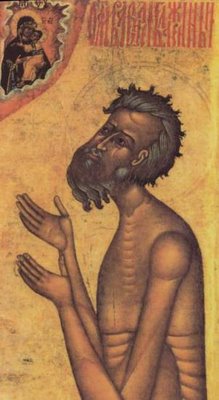Saint Basil the Blessed, Fool for Christ
 Saint Basil the Blessed, was born in December 1468 on the portico of the Elokhov church outside Moscow. His parents were commoners and sent their son to be trained as a cobbler. During Basil's apprenticeship, the master cobbler happened to witness an occurrence, which showed him that his apprentice was not an ordinary young man. A merchant had brought grain to Moscow on a barge and came in to order boots, specifying that they be made in a particular way, since he would not pick them up for a year. After taking the order, Saint Basil began to weep and said, "I wish you would cancel the order, since you will never wear them." Confused, the master cobbler questioned his apprentice, and he explained that the man would not wear the boots, for he would soon die. After several days the prediction came true.
Saint Basil the Blessed, was born in December 1468 on the portico of the Elokhov church outside Moscow. His parents were commoners and sent their son to be trained as a cobbler. During Basil's apprenticeship, the master cobbler happened to witness an occurrence, which showed him that his apprentice was not an ordinary young man. A merchant had brought grain to Moscow on a barge and came in to order boots, specifying that they be made in a particular way, since he would not pick them up for a year. After taking the order, Saint Basil began to weep and said, "I wish you would cancel the order, since you will never wear them." Confused, the master cobbler questioned his apprentice, and he explained that the man would not wear the boots, for he would soon die. After several days the prediction came true.
When he was sixteen, the saint arrived in Moscow and began to display what is called "Yurodivy" or foolishness for Christ. In the burning summer heat and in the freezing Russian winters, he walked barefoot through the streets of Moscow. His actions were strange, for instance, he would topple kalachi and kvas stands in the marketplace. Angry merchants would throttle and beat Saint Basil, but he welcomed the abuse with joy and he thanked God for it. Soon after it would be discovered that the kalachi was poorly cooked, and the kvas was badly prepared. The reputation of St Basil quickly grew. People saw him as a holy fool, a man of God, and a denouncer of wrong.
Another story tells of a merchant who wanted to build a stone church on in Moscow, but its arches collapsed three times. The merchant turned to the saint for advice, and he pointed him toward Kiev. "Find John the Cripple," he said. "He will advise you how to construct the church." Traveling to Kiev, the merchant sought out John, who sat in a poor hut and rocked an empty cradle. "Whom do you rock?" asked the merchant. "I weep for my mother, who was made poor by my birth and upbringing." Only then did the merchant remember his own mother, whom he had thrown out of the house. Then it became clear to him why he was not able to build the church. Returning to Moscow, he brought his mother home, begged her forgiveness, and built the church.
Preaching mercy, Saint Basil helped those who were ashamed to ask for alms, but who were more in need of help than others. Once, he gave away a rich imperial present to a foreign merchant who had been left destitute. Although the man had eaten nothing for three days, he was not able to beg for food, since he wore fine clothing. The saint harshly condemned those who gave to the poor for selfish reasons, not out of compassion, but hoping for an easy way to attract God's blessings. St Basil also visited the taverns, where he tried to see goodness, even in people who others had given up as lost, and to strengthen and encourage them by kindness.
Once Saint Basil even reproached Tsar Ivan the Terrible, saying that during the divine services the Tsar was preoccupied with thoughts of building a palace in the Vorobiev hills.
St Basil died on August 2, 1557. His body was buried in the cemetery of Trinity church, where in 1554, In an early icon, St Basil is portrayed as old, with white hair curling at his ears, and a short, curly white beard. He is completely naked, and holds a handkerchief in his hand. The veneration of St Basil the Blessed was always so strong that the Trinity temple and the attached Protection church were renamed for him as the famous St Basil's Cathedral in Moscow. The saint's chains, his relics, are preserved at the Moscow Spiritual Academy.
No comments:
Post a Comment